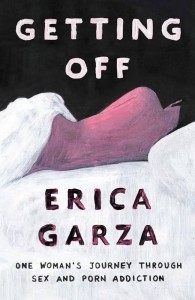A few minutes after her late-night booty call had left, US woman Erica Garza turned on her laptop to watch a raunchy video.
She finally brought herself to orgasm twice after being “too tired” to climax with her visitor.
The particular scene featured a teenage cheerleader having sex with her stepfather while her mother showered upstairs. It was tame compared to Garza’s favourite film, which showed a gangbang at a factory in which two women were ritually humiliated.
“That was my thing,” the 35-year-old writer told the New York Post of the peak of her porn obsession. “That’s how I got off.”
Indeed, “Getting Off” is the title of Garza’s revealing new memoir. Released this week in the US, it chronicles the two-decades-long addiction to sex and porn that began in her teens.
In it, she describes how she went from a self-conscious Catholic schoolgirl to a promiscuous adult hooked on risky intercourse and cellphone smut — an addiction widely regarded as more of a man’s “problem” than a woman’s.
“What I got was an elaborate mixture of shame and sexual excitement I had come to depend on since I was 12 years old,” Garza, now a monogamous and married mother of one, writes. “My methods of getting this only became darker and more intense, wreaking havoc on all aspects of my life.”
Her porn habit started when she was struggling to fit in at middle-school in the Los Angeles suburb of Montebello. Her main insecurity? Having to wear a back brace because she suffered from scoliosis. Bullied because of her appearance, she sought escape in watching soft-core porn on late-night cable TV.
Over her teenage years, as technology advanced — and she was able to stream porn over the Internet — Garza secretly accessed the salacious material whenever she wanted. She vividly remembers the leaked Pamela Anderson and Tommy Lee sex tape that came out in 1997, when Garza was 15.
“I used to hide with my computer in the bedroom closet,” she said. “Part of the thrill was that I might get caught.”
She wasn’t. And, after losing her virginity at 17, she almost got to the stage where she couldn’t imagine intercourse without her crutch.
“If I felt uncomfortable with the person I was having sex with, I put on porn as a kind of distraction,” added Garza, who says her male lovers regarded her as a “cool girl” because of her interest. “It felt like a relief for me because we had a sort of wall between us, and we didn’t have to get as [emotionally] intimate as we could have.”
After college, she engaged in violent and risky sex while moving around to Hawaii, LA, London and New York. It frequently involved hooking up with strangers without using condoms. Her preference heightened to hard-core porn, such as the scene in the factory featuring “two sweaty women and 50 horny men.”

“I think it was the element of shock,” she said.
Often, Garza’s real-life sex life mimicked porn scenes in which women were demeaned.
“Afterwards, I would feel broken, unlovable, worthless and used,” she said. “But I was using men for my own needs, too.”
She was also influenced by the smoothly shaven look of the actresses — paying $50 every three weeks for a Brazilian wax so her private parts remained hair-free.
It wasn’t until her early 30s that Garza realized her infatuation was preventing her from bonding with men. That all changed when she met her now-husband, a 39-year-old app designer, on a trip to Bali.
“We watched porn at the beginning [of the relationship] because that was my habit,” said Garza, “but he wanted me to talk about why I used porn, and nobody had ever done that before.

“For the first time, I really felt that I could be safe, supported and reveal who I was.”
Back in LA, Garza tried the 12-step method to wean herself off her addiction. It worked to a limited extent: “However, I didn’t agree with the philosophy that you are powerless against this disease.”
So, with help from her husband, as well as yoga and therapy, Garza didn’t watch porn for six months. She now uses it occasionally and “healthily.”
“I realized that I’m not alone, that it’s OK,” she said. “I just wanted to stop feeling the shame aspect of it, and I succeeded.”
Source: nypost.com
Ask me anything
Explore related questions






